Op-ed by Carole James at The Tyee. “Two of the central messages I have heard back are that sound economic decision making must focus on the future as well as the present and that the impact on community health and the environment must be key considerations.” Read article
Category Archives: Mining
A Fracking Disaster in the Making
Article by Andrew Nikiforuk at The Tyee. “The earth-shattering exploitation of deep deposits of shale rock for natural gas production has broken global records in northeast British Columbia and now threatens critical water supplies across the country, warns a new Munk School of Global Affairs report by award-winning B.C. journalist Ben Parfitt.” Read article
Gravel pit challenge
Enviro rally this Saturday features Rafe Mair
Article in the Agassiz-Harrison Observer. The rally starts at noon at the Harrison Mills Community Hall. Read article
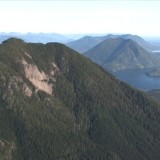
Clayoquot Defenders Rally to Stop Catface Copper Mine
A group of concerned citizens, conservationists, and First Nations gathered outside
the AGM of Imperial Metals in Vancouver recently to voice their opposition to the
company’s proposed open pit copper mine on Catface Mountain, in the heart of
Clayoquot Sound. Learn about the threats to Clayoquot from one of the most
destructive forms of mining there is. Three minutes.
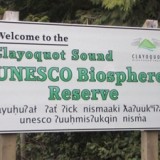
Clayoquot under siege: Ecological gem still threatened by logging, mining, fish farms
“Every normal man must be tempted, at times, to spit upon his hands, hoist the black flag, and begin slitting throats”. (H.L. Mencken)
Those who fought to save the trees at Clayoquot and the tens of thousands of their fellow citizens – indeed environmental defenders from all over the globe – would, if they knew the truth, be appalled and ashamed and fighting mad at what has happened since 1994 when then Premier Mike Harcourt thought he had protected much of the Clayoquot old growth timber.
The battle known as the “War In The Woods” solved little if anything when all’s said and done. In 1993, the war commenced with almost 1000 protesters winding up in jail. The “war” became international with eco-stars like Robert F. Kennedy getting in the trenches. Clayoquot Sound was named a Biosphere Reserve by UNESCO. An independent panel of scientists got into the act as did the NDP government of the day – but once the fine print was read, the various agreements and legislative efforts following 1993 did little to change things. Tragically, as too often is the case, destitute First Nations – aided by newer, smaller outside companies only too eager to help them harvest and sell Clayoquot’s forests – wound up doing the logging. And they were no better able to do it in an environmentally sound way than were the large companies which left because they couldn’t make money if the new rules were enforced. The bottom line is that whether the area was clear-cut, helicopter logged, or a combination of methods, they could no longer turn a profit, so they left. But the First Nations need money and the forest suffers accordingly.
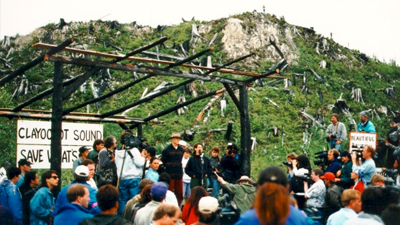
In the final analysis, Clayoquot Sound is an international symbol of how environmental fights usually end with the environmental groups winning the battle yet losing the war.
In fact, Clayoquot Sound environmentalists resemble a prize fighter who valiantly gets off the canvass only to be knocked down again, for in addition to the forestry battle they thought they had won, they might now be down for the count with several other environmental catastrophes in the ring wielding knockout punches.
Clayoquot Sound is an unbelievable gem in a coast of gems. Famous for its waves which attract thousands of surfers every year, it is, or was, also famous for its salmon fishing. Perhaps most of all, Clayoquot Sound is a place you want to be – a spectacular rain forest close enough to “civilization” to be reachable, yet seemingly remote.
As if the logging weren’t bad enough, there is a proposed copper mine on Catface Mountain, which, if it is approved and brought to fruition, will literally lop off a third of the mountain – and mine deep into its core. The good news is that the test drilling thus far shows low grade copper, calling into doubt its viability; the bad news is that if world prices of copper are high, this means huge open pit mining because extracting low grade mineral means much more rock must be taken for the undertaking to work. As I write this, 22 further holes are being drilled and results will be known by year’s end.
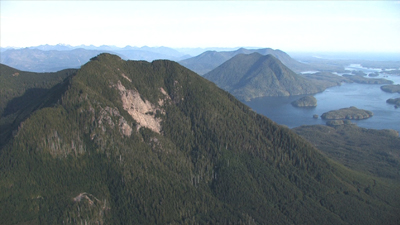
Clayoquot Sound has always been known for spectacular fishing, supporting substantial commercial and sports fisheries. Enter the salmon farmers. Much attention has been paid to the ruinous contact of Broughton Archipelago migrating salmon and the clouds of sea lice from fish farms there. More recently, thanks to the vigorous scientific work by Alexandra Morton, the environmentalist hero of the Broughton tragedy, we now know that sockeye from the Fraser are all but certainly facing the same fish farm-induced perils faced by the pinks and chum in the Broughton Archipelago. While the research into the impacts of salmon farms continues at Clayoquot Sound, every indication is that it’s Broughton Archipelago re-visited, and then some. (See my colleague Damien Gillis’ new film on the salmon farm situation in Clayoquot here).
The Department of Fisheries and Oceans is on the matter, but how comforting is that? Will it be the same DFO we’ve come to have contempt for? Will it again be like lying sick in hospital and the undertaker comes to visit with a tape measure in his hand? Unhappily, that’s not all. Tofino dumps its raw sewage into the ocean, sewage that increases as tourists arrive. The mayor and council know the harm this does but say, simply, that with the tax base they must work with they simply cannot provide the treatment that’s needed.
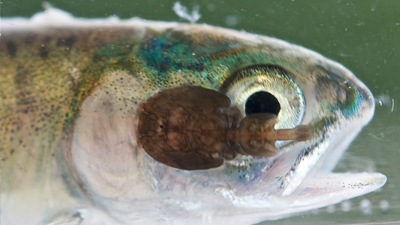
The mayor and council have done their damndest to protect their beautiful unique sound, as have environmental groups, but as long as the situation I’ve described continues, it will be one pace forward, two paces back.
History tells us that DFO, who is supposed to protect wild fish, is mandated to support fish farms by a government of ignorant cretins which hasn’t a soupçon of care for the environment. We also know that the provincial government can’t wait to have private companies destroy our rivers for power and the profits destined for out-of-province shareholders of large international corporations – indeed one private power dam (the industry prefers we call them weirs) is under construction in Clayoquot, with several more to follow.
Clayoquot Sound, the place everyone thought had been made safe for nature, sits on the edge of the precipice overlooking utter destruction while industry – and it must be said some First Nations – and the two senior governments are fighting to see who will give it the last and fatal push.
If we are to have any hope of truly protecting this magical place, it’s high time we hoisted up that black flag again.

Maude Barlow on Fish Lake and Protecting Canada’s Water
Canadian water warrior and international environmental powerhouse Maude Barlow spoke
recently to a crowd of several hundred in Vancouver on the plan to turn Fish Lake
and possibly 20 other lakes across Canada into toxic dumps for mines. The National
Chair of the Council of Canadians and former Senior Advisor on Water to the United
Nations was joined by Chief Marilyn Baptiste of the Xeni Gwet’in First Nation – in
whose traditional Tsilqot’in territory Fish Lake lies – and Greenpeace co-founder
Rex Weyler for the insightful talk. Maude and her co-presenters discussed the Fish
Lake proposal, the Harper policy known as Schedule 2 – designed to water down the
Fisheries Act to allow mines to use lakes for tailing ponds – and the critical state
of water in Canada and around the world. A must-see for anyone who cares about
protecting our water. Eight minutes.
Chilliwack River Gravel Pit Opposition Grows
Article by Walter Neufeld in Chilliwack Today. “What does it take to stop the Minister of State for Mining from lying to BC constituents? The answer, it seems, is that he will not be stopped. Our friends in the Chilliwack River Valley are Randy Hawes’ latest victims.” Read article
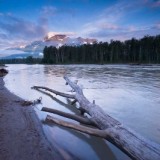
Taku Watershed: Salmon Stronghold Threatened by Mine
A world-renown tourism destination and home
to all five species of pacific salmon, multiple species of trout, and
200 plant and animal species, the Taku Watershed is threatened by a
plan to re-open a 50 year-old mine.
You will know Rex Weyler as a co-founder of Greenpeace, the author of the definitive history of that organization which started in Vancouver, and author of many books the most recent of which was The Jesus Sayings.
Not long ago I attended a public meeting on the public power issue and heard Rex speak and an eloquent and timely speech it was. It made me uncomfortable, as I’m sure it did others because I could see he was talking to all of us. Simply put, our desire to consume is running ahead of the world’s ability to supply what we want. Rex concentrated on oil, the production of which has peaked – meaning that we consume more than is being discovered – but he went further and described what we now insist upon having, compared to that which satisfied our grandparents. He asks if we’re really happier than they were.
[See and hear this speech here.]
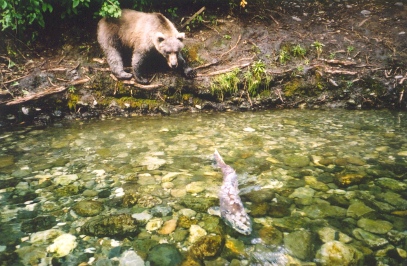
It made me think – since last December, Wendy and I have flown to London and return, then to Auckland for a cruise that got us to Bangkok thence the flight home – nearly 50 hours of helping airlines consume fossil fuels not to mention the cruise ship. Was Rex talking to us?
You’re damned right he was – all of us.
We, all of us, must re-evaluate our priorities. The older of us grew up in the era where there was always another valley to log and another stream to take the place of the one under the new subdivision. There was this need to constantly expand without any concern for the consequences. Rex asks the critical questions that I used to ask when I chaired meetings on Sustainability for Metro Vancouver – where does it all end? Do we just go on expanding, cutting an ever-greater swath through the environment without a care because we just know there must be more nice stuff over yonder mountain?
Perhaps it’s best that we do our plundering of Mother Earth far away where we can’t see it…In a recent article I asked why, if we were going to turn Fish Lake into a toxic dump for a mine, shouldn’t we log Stanley Park, subdivide Little Mountain and develop Burns Bog? What right have we to save our favourite places while destroying areas we can’t see?
We, at The Common Sense Canadian are committed to fighting the Campbell’s private river policy with all our might and main – while devastation is planned over that range of mountains that blocks our view of the Taku River.
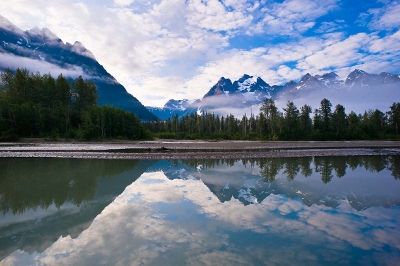
Out of sight, out of mind?
The Taku River rises in Northern British Columbia and spills into the Pacific near Juneau, Alaska. To get a sense of what this wild river looks like you will see, attached, some wonderful pictures by David Nunuk – courtesy of Nola Poirier who, along with First Nations’ people and local concerned citizens, is working hard to raise concerns about this proposed mine.
The Taku has all five species of migrating salmon plus the Steelhead, (a sea going Rainbow Trout), resident Rainbows, Cutthroat, Dolly Varden, and Bull Trout.
*A science note – at one time the Rainbow and the Cutthroat were classified as true trout along with Atlantic salmon and Brown trout (prefix Salmo) but that was changed some years ago and they are now classified as Oncorhynchus like the five migrating species. The Bull Trout and the Dolly Varden are close relatives, namely Chars (Salvelinus).
Mark Angelo is a renowned river conservationist, paddler, teacher and writer. He served as head of the Fish, Wildlife and Recreation Program at the British Columbia Institute of Technology for many years and is now the Chair of their new Rivers Institute. Also Chair of the Outdoor Recreation Council of BC and founder of BC and World Rivers Day, Mark is broadly viewed as one of North America’s pre-eminent river conservationists. In 2008 The Outdoor Recreation Council found that the Taku was one
of the most endangered rivers in BC, owning to this mining proposal.
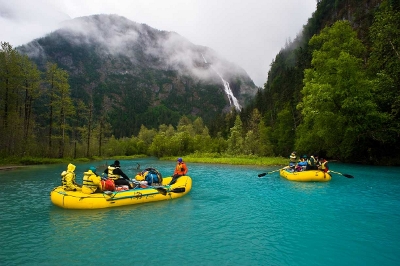
Here’s what Mark had to say in a recent article:”… the Taku is the best international watershed left for salmon, hosting robust populations of the five Pacific salmon species. A multimillion dollar commercial and sport fishing industry depends on the Taku as does a less quantifiable but equally significant First Nations and native American cultural connection of countless generations.”
Mark continues… “also dependent on the Taku is the watershed’s extraordinary biodiversity – grizzly bear, bald eagles, sea lions and forest primeval – dependent on salmon as food and nutrient source. Research has demonstrated that the marine-derived nutrient salmon deliver far into the interior via natal watersheds benefit nearly 200 plant and animal species …”
He goes on, “Encompassing almost 19,000 square kilometers, the Taku watershed remains wild; fully intact, without roads and other development”.
Now the problem. There is a land use plan (LUP) being developed between the Tlinget First Nation and the BC government, BUT the provincial government is determined that mining be allowed – and there is a prospective mine upstream from the salmon rearing sites. Redfern Resources has been proposing for several years to re-open an
old zinc-copper-silver-gold mine on the Taku, near Atlin, BC – closed
in 1957 by then owner Cominco. Minerals from the Tulsequah Chief Mine
would be shipped down river by barge. Roads required to access and
build the mine would fragment key habitat and threaten the river with
inevitable acid drainage. Because we share the Taku watershed with our
Alaskan neighbours, the issue is of concern across the border as well.
Redfern Resources recently went into receivership amid questions about
project costs – but we now by way of Alaskan authorities (not our own
provincial government, mind you), that plans are in the works to
transfer the claim and project proposal to another company. As long as
there’s value to the resource, this river will be at risk – which is
why the public must come to its defense.
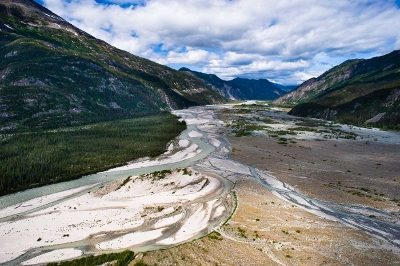
One must also ask: if you’re going to have a mining operation
and all that entails, what’s the point of an LUP? No one is suggesting that masses of people will be moving into the area, so surely an LUP protects existing values against existing perils – and you can’t protect the values of the Taku if there’s a mine. That simple.
Moreover, once you do have the mine, that’s the thin edge of the wedge. More development will come and the river will, like so many others, be sacrificed for the use of mankind.
Let’s go back to Rex Weyler. He makes the point that mankind will keep on consuming until there’s nothing left to consume. Two examples: That’s what happened on the east coast cod fishery as fishermen were clamoring for the right to fish when there weren’t any fish left; that’s also what happened on Easter Island where the inhabitants destroyed their abundant flora in order to make those big statues and kept on making statues even when the end of the flora was in sight.
Is this what our fate is! Are there no stop signs? Is nowhere sacred except the tiny bits of the outdoors near large centres of population? Stanley Park is sacred but the Taku is not because city folk can see the park but not the river? Do we believe, contrary to all the evidence, that we can both mine the ore and have fish and wildlife too?
Or have we perhaps decided that we must have “progress” and that that trumps the environment? Is British Columbia the new Easter Island where we will go on building monuments to our stupidity and to hell with the consequences?
Perhaps it will be the Taku that answers that question.
Wouldn’t it be great – if unlikely – if we said NO!
To learn more and take action, go to http://www.takulegacy.org
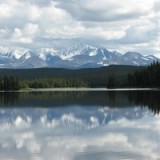
Fish Lake: A battle worth fighting
The Campbell Government signed off last year on turning Fish Lake (a.k.a. Teztan Biny), home to 85,000 rainbow trout, into a toxic dump for Taseko Mines’ proposed “Prosperity Mine,” west of Williams Lake. Now, as the federal government wraps up its public Panel Review of the proposal, TheCanadian.org is calling on all Common Sense Canadians to write to Stephen Harper and let him know they what they think of turning lakes into toxic mining dumps. Even the federal Department of Fisheries and Oceans has expressed grave concerns about this one – and is it any wonder? The plan is to turn a perfectly healthy lake into a tailing pond, then build a new lake to replace it! Where’s the sense in that?
I want to talk about two matters here … and they’re very much related – Fish Lake and the Federal Government’s aquatic policy. I’m deeply indebted to John Werring, Habitat Specialist for the David Suzuki Society, who once worked for the Department of Fisheries and Oceans, for much of the background information on this story.
I want to speak especially to citizens who basically support the federal Tories and Liberals, and those who support the Liberals in BC. I’m going to plead with you to put your province and country ahead of politics. If we’re going to have any chance at all to save our environment we must rise as one and say that party loyalties must be trumped by caring citizens and that if we don’t take this position, we will be, as Churchill said at the time of Munich in 1938, quoting the Bible, “weighed in the measure and found wanting”.
Our sights must be set mostly on the federal government because the Campbell government has told us, decision by decision, non-decision by non-decision, that they simply don’t care. Wild salmon be damned, lakes and rivers be damned, sensitive ecological areas be damned – we’re going to let our friends in the corporate sector do what they please and any environmental actions we take will be shams and we won’t even try to make it look good.
Campbell & Co, like Harper & Co, couldn’t care less about aboriginal concerns.
Let’s look at Tory policy and come back to Fish Lake specifically in a moment.
Harper has selected 18 lakes or rivers across Canada as open to mines for dumping their tailings into. This is where their heads are!
A recent survey by Fisheries and Oceans Canada (DFO), looking at key sustainability indicators, found that over half of our rivers and lakes in Canada are fair to poor in terms of water quality.
Who cares?
It is the firm policy of the Tory government that Aquaculture will double – and DFO has been warned not to even mention “closed containment”.
We have, John Werring observes, on a broad range of environmental issues, reached the tipping point and the public is still dozing, content or at least complacent with governments’ unwillingness to protect the environment and the creatures in it.
Let’s tackle the existing government policy head on: they believe that corporations will find it in their interest to care for the environment so we needn’t trouble them with tiresome regulations let alone enforcement.
Many years ago, our local and very influential right wing think tank, the Fraser Institute, put out a study that claimed that it would be in the public interest for all rivers to be privately owned. The then Executive Director, Michael Walker, told me that private use would mean the best available use.
Stunned, I replied, “But the best available use of a river for industry is as a sewer”, the proof of which is evident worldwide. I asked, not believing what I was hearing, what would happen to Rafe Mair’s Fishing Camp, down stream from the Anything Goes Paper Mill when it spilled black liquor into the river and killed all the fish?
He replied that my little fishing camp could sue the company and he was astonished to hear me say that was cold comfort indeed for my little fishing company.
We must understand that the sole rationale for a corporation is to make money – if they are “good corporate citizens” it’s because it’s in their interest to be so.
I believe in the “free market”, provided there are laws and policemen to enforce them. Tories and Campbell Liberals don’t like rules that impede the “progress” of their political donors.
When Campbell came into office I asked Joyce Murray, who was as close as they would get to an environment minister, if she was the policeman in the environment?
Heavens no! she replied, “I’m here to help industry get past all that environmental red tape”. You’ll be comforted to know that she’s a Liberal MP now and, no doubt, she stands up boldly in Caucus for the sanctity of our fish and wildlife with the same dedication we’ve come to expect from her ilk.
Let’s look now at Fish Lake. I’ve written about this on TheCanadian.org – A priceless BC asset threatened by mining – but I want to deal with just two of many available points here.
What the hell sort of society have we become when we would even consider killing 85,000 Rainbow Trout so that a mining company could dump its tailings and assorted crud in their lake – and not see the black humour in their offer to build another lake?
Why aren’t we rising as one in protest? Did our mothers and fathers not instill in us any respect for what God gave us?
Let me pose this question: if killing lakes and all that’s in them is acceptable practice, why hold hearings at all? Better just get on with it rather than waste time with “show” hearings.
Last, but for sure not least, involves First Nations. They aren’t going to lie down and take it either over killing Fish Lake or over the proposed Enbridge Pipeline from the Tar Sands to Kitimat, thence by tanker down the coast. Governments aren’t paying attention – they’d better.
I know we’re all tired. Never in my long life have I seen so many serious assaults on our outdoors by so many people in so many places.
But damn it, we have to fight! This is war! A real war on us by our own governments. We must do all within lawful means to stop these bastards now – for if we don’t, there won’t be much left for those we leave behind.
Blue Gold: The Tsilhqot’in Fight for Teztan Biny (Fish Lake) from Susan Smitten on Vimeo.
